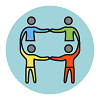[Ttitle card] Tricky friends
Having good friends is one of the things that can make life really great but friendships can be tricky and even a really good friend can make us feel bad sometimes.
So it's good to talk about our friends with our carers and our family.
It's wise to talk about the kinds of things that you do together.
It's nice to share good memories and it can be really helpful to get some advice, if you don't think your friends are making you happy right now.
These are some of the things you should talk about with your carer, before it reaches boiling point.
If a friend plays a trick on you or tries to make you angry and then says that it's all a joke.
If they call you names you don't like, either face-to-face or online.
If someone asks you to share pictures or videos with them over the internet, or if a friend wants to use your cash card.
Something else that's good to talk about is if your friend asks to borrow something and then doesn't bring it back.
Or if they bring people to your house that you don't know, without your permission.
It's good to have some rules about what a friend is and isn't allowed to do, for example, they should never refuse to leave if you ask them to or ask you to look after something, or even deliver it somewhere, without telling you the truth about what it is.
They shouldn't take money without asking or make you pay for things for them, like food or alcohol. They should never make you feel scared, out of control, or like you can't say no when they want you to do something.
A good friend should never ask you to keep secrets about the way they behave. Talking about faithful friends, with carers or family, is a nice way to relive some of your favourite memories and to make sure your friends are still being good friends.
An important thing to remember is that a good friend is someone that makes you feel safe, someone that makes you laugh and is interested in the same kind of things that you are.
So to finish, just remember that it's great to have friends, but if they do or say anything that makes you feel bad, you should talk about what's going on with someone you trust, like a family member, neighbour, key worker or anyone else who provides you with support.
[End card] If you are worried about yourself, or someone that you know, you can talk to someone about your concerns by calling 0800 145 6095. To find out more about safeguarding adults in Hammersmith and Fulham including how to report concerns online visit: www.hfsafeguardingadults.org.uk
